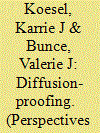|
|
|
Sort Order |
|
|
|
Items / Page
|
|
|
|
|
|
|
| Srl | Item |
| 1 |
ID:
127118


|
|
|
|
|
| Publication |
2013.
|
| Summary/Abstract |
Do authoritarian leaders take preemptive actions to deter their citizens from joining cross-national waves of popular mobilizations against authoritarian rulers? Are they more likely to engage in such behavior when these uprisings appear to be more threatening-in particular, when they take place in neighboring countries and in regimes that resemble their own? We provide answers to these questions by comparing the responses of the Russian and Chinese leadership to two such waves: the color revolutions and the Arab uprisings. We conclude that, despite differences in the ostensible threats posed by these two waves, they nonetheless prompted the leaders of both of these countries to introduce similar preemptive measures in order to "diffusion-proof" their rule from the color revolutions and the Arab upheavals. These findings have some important implications for our understanding of authoritarian politics and diffusion processes. One is to reinforce the emphasis in many recent studies on the strategic foundations of authoritarian resilience. That recognized, however, we would add that the authoritarian toolkit needs to be expanded to include policies that preempt international, as well as domestic threats. The other is to provide further confirmation, in this case derived from the behavior of authoritarian rulers, of how scholars have understood the drivers of cross-national diffusion. At the same time, however, we counsel students of diffusion to pay more attention to the role of resisters, as well as to adopters. In this sense, the geographical reach of diffusion is much broader than many analysts have recognized.
|
|
|
|
|
|
|
|
|
|
|
|
|
|
|
|
| 2 |
ID:
123889


|
|
|
|
|
| Publication |
2013.
|
| Summary/Abstract |
Since the middle of the last decade the Russian leadership has conducted a strategic overhaul, publishing a cascade of new concepts, strategies and doctrines that attempt to frame plans in a long-term horizon to 2020 and beyond. Following Vladimir Putin's re-election in 2012, a series of presidential instructions and new plans have been published to update this overhaul.
This article examines this commitment to strategic planning and whether it is tantamount to a grand strategy. The article explores the various understandings of Russian strategy in the existing literature, before sketching a definition of grand strategy.
It suggests that Moscow has shaped a broad horizon and made some progress towards achieving the goals it has set out. But a grand strategy is more than formulating plans; it is also the coordination of relevant organizations and resources - 'conducting the orchestra' - to execute effectively the plans.
The article thus concludes by exploring the difficulties Moscow faces: on the one hand, an evolving and competitive international context and, on the other, a domestic context burdened by a heavy inheritance from the USSR and contemporary Russian problems. Taken all together, these suggest that although Moscow is committed to strategic planning, a grand strategy remains a work in progress.
|
|
|
|
|
|
|
|
|
|
|
|
|
|
|
|
| 3 |
ID:
120669


|
|
|
|
|
| Publication |
2013.
|
| Summary/Abstract |
Russia's recovery from the deep economic crisis it experienced in 2008-2009 did not deliver clear political dividends for the Russian leadership. This is because of the context in which the crisis occurred and the way that the leadership, particularly President Medvedev, and many of its critics described the crisis. The oil-fuelled boom that preceded the crisis had the effect of deepening it. Economic recovery based on rising energy prices looks like a failure, rather than a success, and highlights the underlying structural problems of the Russian economy. Arguments about the need for modernisation from within government exacerbated this perception. This seems to have weakened the connection between approval for the leadership and economic growth, a staple of pre-crisis politics.
|
|
|
|
|
|
|
|
|
|
|
|
|
|
|
|
|
|
|
|
|